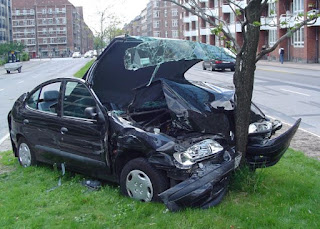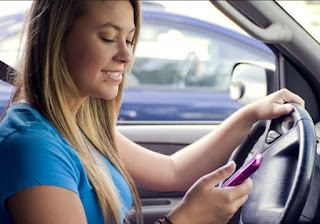How to Keep Summer Squalls from Wrecking Your Ride
By Diane Tait
 |
| Image courtesy of wikimedia |
Now that summer is here in north Florida, that means
one thing: Summer squalls. Those of you who
moved to Florida from other parts of the country have no doubt had to contend
with driving in the rain. The difference
is when you’re forced to deal with a full on, no-holds-barred thunderstorm
here, don’t think rain, think free car wash.
That’s because rain squalls in Florida are as fierce as they are
prevalent. The rain that comes down on an
almost daily basis in the Jacksonville area falls from the sky in torrents that
can make windshield wipers nearly useless and visibility nearly zero. That’s why more auto accidents happen in the
summer in Florida than in any other part of the country. If you want to keep summer squalls from
wrecking your ride and causing your auto insurance rates to rise, here are some
helpful hints.
How
well is your car maintained?
When the rain comes down in sheets and the wind is
gusting hard, this is the last place to figure out you need new windshield
wipers or a front-end alignment. It’s
also the worst possible moment to think about replacing those bald tires. Even new radials have difficulty dealing with
water that ponds on road surfaces when the rain is coming down in buckets. If your tires are bald, or nearly bald, you’re
simply asking for trouble. The next
puddle you hit could be your last. All
it takes for a car to hydroplane is ¼ inch of water. Once your tires lose contact with the
roadway, you run the risk of losing control of your vehicle as soon as you hit
a curve or step on the brakes. If your
alignment is off, this is another invitation for disaster on the road.
Then there’s your windshield wipers. If your wipers chatter or streak even when
there is plenty of water on the windshield, it’s past the time they were
replaced. When you consider that wiper blades only run about $20, this is a
small price to pay for safety. In Florida, you really should replace your
blades every two years, just to be on the safe side.
Slow
down, you drive too fast.
 |
| I,age courtesy of Public Domain Pictures |
They say speed kills.
While this maxim is true, it is doubly so when it rains. Even if the speed limit reads 65 MPH, that
only means this is the safe and legal speed limit to drive when weather
permits. When it’s raining cats and
dogs, driving the speed limit can quickly become a highway to the danger
zone. The problem is, most drivers
honestly don’t know how fast is too fast when they get caught in an afternoon
gully washer. They either drive too
fast, or they slow down to a crawl, which can be just as dangerous when
visibility is reduced.
In 2016, 3,091 people died in traffic accidents in
Florida, the highest level since 2007. While they weren’t all weather related,
you can bet a significant percentage of them were. The problem when people drive in the rain is
they fail to realize how long it takes a vehicle to brake on a wet road. Add to this the tendency of many drivers to
leave too little space between their vehicle and the one ahead of theirs and
this is also a recipe for disaster.
Another killer most people forget about when they
drive in the rain are tractor trailers.
If you think you have problems coming to a stop in the rain, just think
of how much tougher this is for a trucker driving a loaded semi. DOT statistics state that wile 4% of
registered vehicles are trucks, yet they are involved in 9% of accidents. Since
tractor trailers can weigh as much as thirty times as much as a typical car, is
it any wonder that when it rains, these juggernauts can become a hazard to
other drivers.
While it’s true that all drivers need to slow down and
provide more leeway between themselves and other motorists, that doesn’t mean
you should come to a halt unless you pull to the side of the road. It’s recommended that you slow down by a
third when it rains, but you need to reduce your speed with caution, keeping
your eyes on traffic ahead and behind.
If you slow down too fast, you could easily wind up being rear
ended. This can lead to a monster pileup
as other cars around you crash as well.
Two ways to make this less likely to occur is to give the driver in
front of you plenty of space and to turn on your headlights.
Many drivers neglect to put their headlights on when
it rains. This can easily lead to an
accident, since it’s extremely difficult to see cars when the rain is pouring
down. Even when visibility is
practically nil, cars with their headlights on are easy to see. Just make sure you only use your low
beams. High beams and/or fog lights will
only serve to blind other drivers. Also,
do NOT turn on your hazard lights. Not
only do they fail to increase your vehicle’s visibility in a rainstorm, it’s
also illegal to turn them on unless your car is disabled. In Florida, you can even be fined $129 for
driving with your hazard lights on.
Put
the cellphone down!
 |
| Image courtesy of Free Stock Photos |
Last but not least, here’s the mother of all road
hazards: Cellphones. Like it or not,
talking on the phone or texting is a distraction that all prudent drivers
should avoid. Even when the weather is
perfect, using a cellphone while driving makes it much more likely that you’ll
be involved in an accident. Doing so in
the rain is like asking for trouble.
More importantly, since 2013, Florida has had laws on
the books banning texting while driving.
“A person may not operate a motor vehicle while manually
typing or entering multiple letters, numbers, symbols or other characters into
a wireless communications device or while sending or reading data in such a
device for the purpose of nonverbal interpersonal communication, included, but
not limited to, communication methods known as texting, e-mailing and instant
messaging.” https://www.dolmanlaw.com/what-exactly-is-the-cell-phone-policy-in-florida/
Does this mean you’ll get pulled over in the event a
police officer sees you texting?
No. However, if an accident
should occur and it’s revealed you were texting while driving, you will be assessed
an additional six points on any moving violation issued. More important is the
statistics reported by the National Safety Commission, that indicated that 42%
of fatal car crashes involved drivers who were using their cellphones at the
time of the accident. If you must use your
cellphone while driving, use a hand’s-free system and never text while behind
the wheel. Your life could depend on it.
As for the other factors that can keep you safe when
the Sunshine State turns into the Sun Shower State, make sure your driving and
car maintenance habits are up to snuff if you wish to keep those
all-too-frequent summer squalls from wrecking your ride.
Diane Tait owns A&B Insurance in Jacksonville, Florida. If you are looking for great auto insurance at affordable rates, give her a call at 904-388-6446 today.


Summer squalls in Florida are a daily occurrence. Read this blog to learn how to keep from becoming a statistic.
ReplyDeleteThese are great suggestions with all the rain we have been having. Thanks ;D
ReplyDeleteGreat article! everyone should slow down and put their phones away while driving.
ReplyDeleteInstantly communicate with a Personal Injury lawyer, if you have undergone an accident. An attorney can help in collecting all the evidence and safely submitting it in court. Further, he or she strives for justice and acts as your representation. Besides, all these cases can be challenging to be proved.
ReplyDeleteMore Blogs for cases:
How to find a personal injury lawyer
Amputation Injury Lawyer
Arthritis Disability & Workplace Lawyer
Aviation Accident Lawyer
Car Accident Lawyer in Texas
Car Accident Lawyer in California
Car Accident Lawyer in Florida
Good information thanks for sharing with us
ReplyDeleteLooking for best general practice lawyer? call us @ +1-727-410-8468